Name: Neuronal Nuclear Protein (NeuN)-clone A60
Description and aplications: NeuN antibody (NEUronal Nuclei; clone A60) specifically recognizes the DNA-binding, neuron-specific protein NeuN, which is present in most CNS and PNS neuronal cell types of all vertebrates. NeuN protein distributions are apparently restricted to neuronal nuclei, perikarya and some proximal neuronal processes in both fetal and adult brain although, some neurons fail to be recognized by NeuN at all ages: INL retinal cells, Cajal-Retzius cells, Purkinje cells, inferior olivary and dentate nucleus neurons, and sympathetic ganglion cells are examples. Immunohistochemically detectable NeuN protein first appears at developmental timepoints that correspond with the withdrawal of the neuron from the cell cycle and/or with the initiation of terminal differentiation of the neuron. Immunoreactivity appears around E9.5 in the mouse neural tube and is extensive throughout the developing nervous system by E12.5. Strong nuclear staining suggests a nuclear regulatory protein function; however, no evidence currently exists as to whether the NeuN protein antigen has a function in the distal cytoplasm or whether it is merely synthesized there before being transported back into the nucleus. No difference between protein isolated from purified nuclei and whole brain extract on immunoblots has been found. The A60 antibody is a neuronal widely used tumor marker. NeuN is expressed in the neuronal component gangliogliomas , ganglioneuromas , Lhermitte -Duclos disease ( gangliocytoma with cerebellar dysplasia) , neurocitomas , in well-differentiated neurons and the oligodendrocytes like component present in dysembryoplastic neuroepithelial tumors . The expression in over 60% of the cells in glial tumors has been referenced in specific cases (1 oligodendroglioma , 3 glioblastomas and one clear cell ependymoma from over 600 cases studied ) . NeuN is often negative in the component neuronal ganglion cell tumors in particular when it is morphologically differentiated . This antibody cross-reacts with other species (mouse, rat, pig , etc.).
Composition: anti- Neuronal Nuclear Protein (NeuN) mouse monoclonal antibody obtained from supernatant culture and prediluted in a tris buffered solution pH 7.4 containing 0.375mM sodium azide solution as bacteriostatic and bactericidal. The quantity of the active antibody was not determined.
Immunogen: Purified cell nuclei from mouse brain


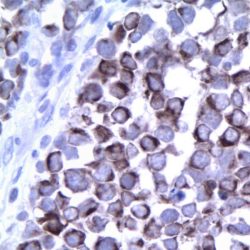
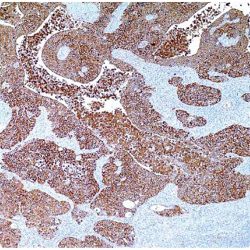
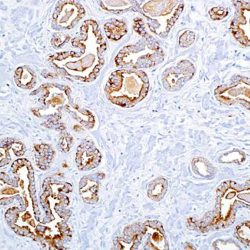
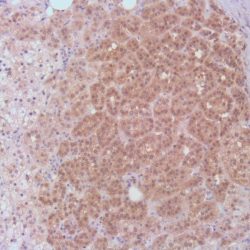
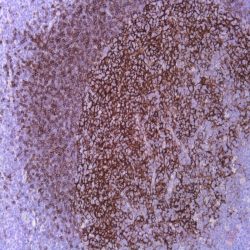
Reviews
There are no reviews yet.